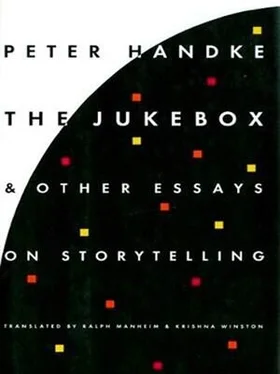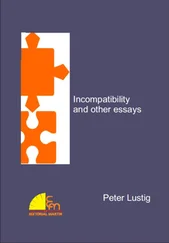Yet now he wanted to run away, not only from this town but also from his topic. The closer he had come to Soria, the intended site for writing, the more insignificant his subject, the “jukebox,” had appeared. The year 1989 was just coming to an end, a year in which in Europe, from day to day and from country to country, so many things seemed to be changing, and with such miraculous ease, that he imagined that someone who had gone for a while without hearing the news, for instance voluntarily shut up in a research station or having spent months in a coma after an accident, would, upon reading his first newspaper, think it was a special joke edition pretending that the wish dreams of the subjugated and separated peoples of the continent had overnight become reality. This year, even for him, who had a background devoid of history and a childhood and youth scarcely enlivened, at most hindered, by historic events (and their neck-craning celebrations), was the year of history: suddenly it seemed as if history, in addition to all its other forms, could be a self-narrating fairy tale, the most real and realistic, the most heavenly and earthly of fairy tales. A few weeks earlier, in Germany, an acquaintance, about to set out to see the Wall, now suddenly open, where he was “determined to be a witness to history,” had urged him to come along so that these events could be “witnessed by a person good with imagery and language.” And he? He had used the excuse of “work, gathering material, preparations”—immediately, instinctively, actually shrinking from the experience, without thinking (though picturing how the very next morning the leading national newspaper would carry, properly framed, the first batch of poems produced by the poetic witnesses to history, and the following morning, likewise, the first song lyrics). And now that history was apparently moving along, day after day, in the guise of the great fairy tale of the world, of humanity, weaving its magic (or was it merely a variation on the old ghost story?), he wanted to be here, far away, in this city surrounded by steppes and bleak cliffs and deaf to history, where, in front of the televisions that blared everywhere, all the people fell silent only once, during a local news item about a man killed by collapsing scaffolding — and here he wanted to essay the unworldly topic of the jukebox, suitable for “refugees from the world,” as he told himself now; a mere plaything, according to the literature, to be sure, “the Americans’ favorite,” but only for the short span of that “Saturday-night fever” after the end of the war. Was there anyone in the present time, when every day was a new historic date, more ridiculous, more perverse than himself?
He did not really take this thought seriously. Of far greater concern was the realization that his little project seemed to contradict what was occurring, more and more powerfully and urgently with the passing years, in the deepest of his nocturnal dreams. There, in the dream depths, his inner pattern revealed itself to him as an image, as image upon image: this he experienced with great force in his sleep, and he continued to dwell on it after awakening. Those dreams insistently told him a story; they told, though only in monumental fragments, which often degenerated into the usual dream nonsense, a world-encompassing epic of war and peace, heaven and earth, West and East, bloody murder, oppression, rebellion and reconciliation, castles and hovels, jungles and sports arenas, going astray and coming home, triumphal unions between total strangers and sacramental marital love, with innumerable, sharply delineated characters: familiar strangers, neighbors who came and went over the decades, distant siblings, film stars and politicians, saints and sinners, ancestors who lived on in these dreams transformed (as they had been in reality), and always new to the children, to the child of the children, who was one of the main characters.
As a rule he himself did not appear, was merely a spectator and listener. As forceful as the images were the feelings this person had; some of them he never experienced while awake, for instance reverence for a simple human face, or ecstasy at the dream blue of a mountain, or even piety (this, too, a feeling) in the face of nothing but the realization “I’m here”; he was acquainted with other feelings as well, but they did not become pure and incarnate to him except in the sensuous intensity of his epic dreaming, where he now experienced not gratitude but the very essence of gratitude, likewise the essence of compassion, the essence of childlikeness, the essence of hatred, the essence of amazement, the essence of friendship, of grief, of abandonment, of fear in the face of death.
Awakening, as if aired out and leavened by such dreams, he felt spreading in waves far beyond him the rhythm he would have to follow with his writing. And again, not for the first time, he was postponing this task, in favor of something inconsequential? (It was those dreams that engendered such thoughts; no one else had authority over him.) And his habit of thinking that, transient as he was, he could commit himself only to occasional pieces — after all, Simenon’s short novels, most of them written abroad, in hotel rooms, could hardly be said to have epic breadth — wasn’t that again, as his dream reproached him, one of those excuses he had been using for too long now? Why didn’t he settle down, no matter where? Didn’t he notice that his travels were more and more just a kind of aimless wandering?
When the “Essay on the Jukebox” had been merely a glimmer, he had had in mind as a possible motto something Picasso had said: One made pictures the way princes made their children — with shepherdesses. One never portrayed the Pantheon, one never painted a Louis XV fauteuil, but one made pictures with a cottage in the Midi, with a packet of tobacco, with an old chair. But the closer he came to carrying out his plan, the less applicable this painter’s saying seemed to a writer’s subject matter. The epic dreams manifested themselves too powerfully, too exclusively, and also too contagiously (infecting him with a yearning to translate them into the appropriate language). He was familiar with the phenomenon from his youth, yet always amazed at how, toward the winter solstice, night after night these dreams turned up, predictably, so to speak; with the first image of half sleep the gate to narrative swung open, and narrative chanted to him all night long. And besides: what did an object like the jukebox, made of plastic, colored glass, and chromed metal, have to do with a chair or a cottage? — Nothing. — Or perhaps something, after all?
He knew of no painter in whose work there was a jukebox, even as an accessory. Not even the Pop artists, with their magnifying view of everything mass-produced, non-original, derivative, seemed to find the jukebox worth bringing into focus. Standing in front of a few paintings by Edward Hopper, with isolated figures in the dim bars of an urban no-man’s-land, he almost had a hallucination, as if the objects were there, but painted over, as it were, an empty, glowing spot. Only one singer came to mind, Van Morrison, to whom the “roar of the jukebox” had remained significant forever, but that was “long gone,” a folk expression for “long ago.”
And besides: why did his picture of what there was to say of this object immediately take the form of a book, even if only a very small one? After all, wasn’t this thing called a book intended, as he conceived it, for the reflection, sentence by sentence, of natural light, of the sun, above all, but not for the description of the dimming artificial light produced by the revolving cylinders of an electrical device. (At least this was the traditional image of a book that he could not shake off.) So wasn’t a small piece of writing like this more suitable for a newspaper, preferably for the weekend magazine, on the nostalgia pages, with color photographs of jukebox models from the earliest times to the present?
Читать дальше












